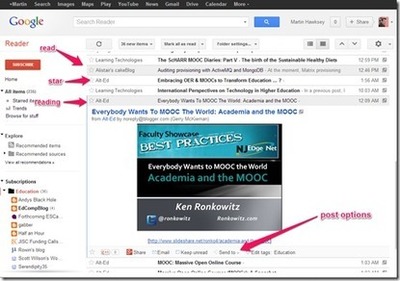 |
Scooped by Irina Radchenko onto Open Knowledge |
Back in August 2012 having surveyed the technology behind a number of connectivist orientated MOOCs (cMOOCs) and I came to the conclusion that:
It’s apparent from the survey of [c]MOOC technology that course teams are taking a loosely joined set of tools that they are comfortable with to facilitate a shared experience with the learner.
I also asked:
Even with the bespoke nature of [c]MOOCs there are still opportunities to start collectively raiding the parts bin. … Given the wide use of WordPress … are there opportunities for [c]MOOC specific themes or plugins?
At the time I highlighted the prevalence of the FeedWordPress plugin for WordPress, which is used to aggregate content from other sites via RSS feeds. Six months on and reading posts mainly from Alan Levine the WordPress parts bins has well and truly been raided. Alan is at an advantage having been involved with the open online course in Digital Storytelling (DS106) and it’s been incredibly useful to see how his recipe has evolved. At the same time others have been turning to WordPress to support their courses. Of note are E-learning and Digital Cultures on Coursera (#edcmooc) , which challenges the division of connectivist (cMOOC) and instructivist (xMOOC) by using the FeedWordPress recipe; and the Open University/OpenLearn/Martin Weller course in Open education (H817).
